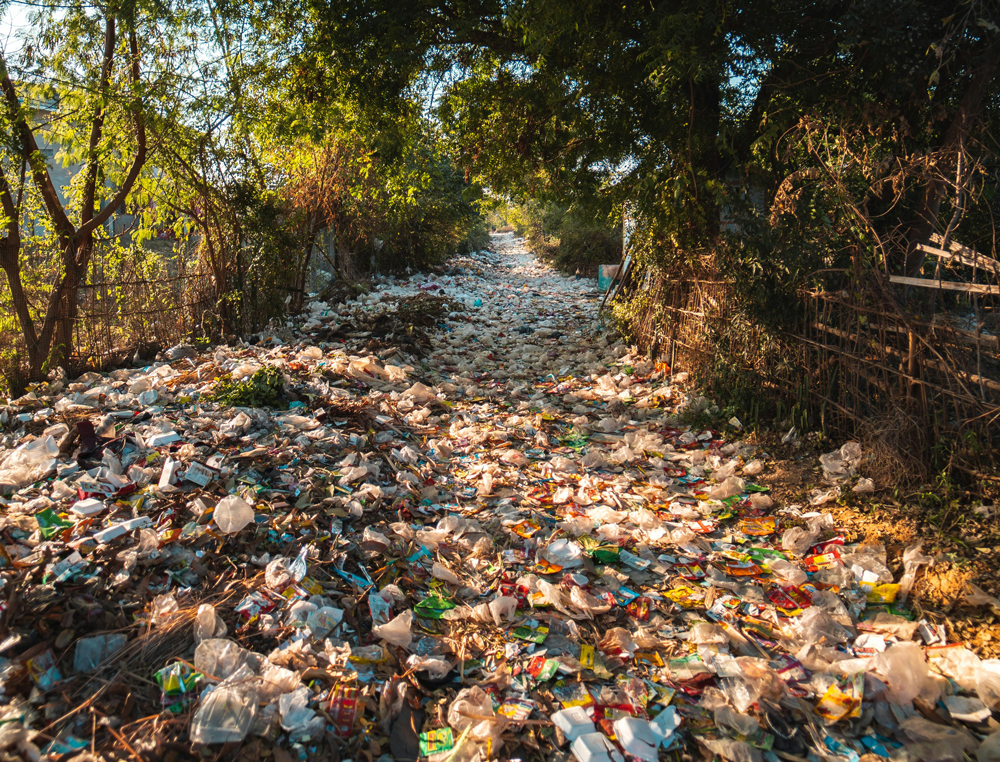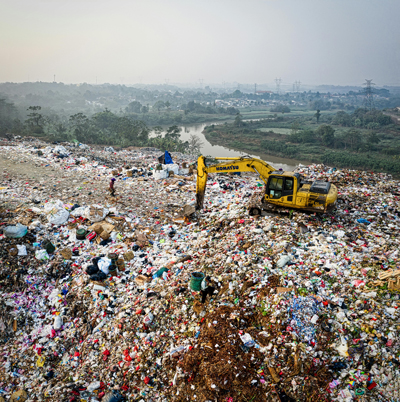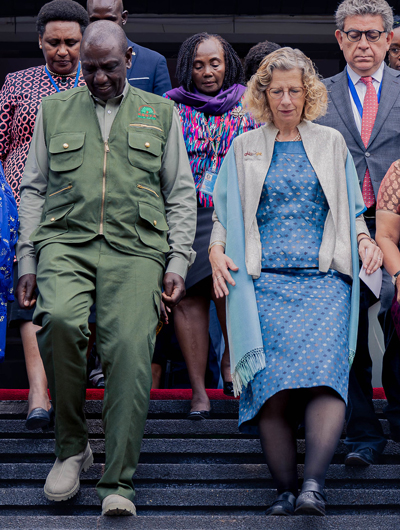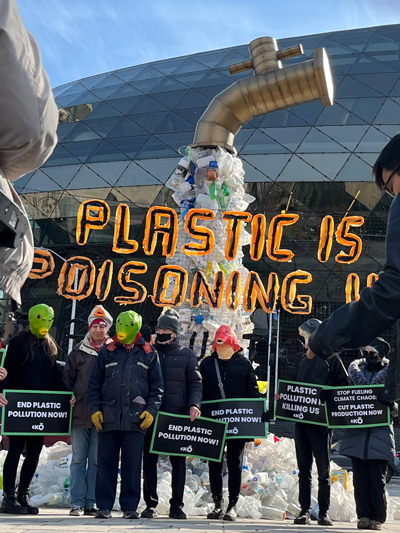Earth Day 2024: Ottawa and the bumpy road to a global plastics treaty
April 22, 2024

April 22, 2024

OTTAWA, 23 APRIL 2024 — On Earth Day 2024, the inter-governmental negotiations on the first ever global plastics treaty (INC4) resume in Ottawa. This fourth round is a break-down or break-through moment.
We all increasingly live, work, eat, drive, fly and sleep in plastics. But plastics are harmful. Some 4,000+ harmful chemicals are used in their manufacturing, with implications for 20 million waste pickers and hundreds of millions in directly affected communities. Problematic plastics carry health implications for billions more, in addition to the quality of all land, air, water, fauna and flora. Globally, the lifecycle of plastics will account for 19% of GHG emissions by 2040 (UNEP) and plastic waste will triple by 2060 (OECD).
Beyond banning wasteful single-use bottles and harmful legacy fishing net, this treaty will, if it emerges, deal with increasing food and air-borne microplastics, the acceleration of plastics alternatives and substitutes, massive upscaling of re-use and recycling in service of circularity, and global industrial product redesign standards. It could impact everything from walk-way fashion and take-out food to advanced aeronautics and medicine.

It would be the first-ever treaty on a universal fundamental material of the built world (think steel, cement and wood) and the first “implementing” treaty of the Paris 2015 climate agreement that significantly contributes to the Net Zero pivot decarbonization of a major sector of human activity. At the carbon-pollution interface, it would be the most significant international agreement until one emerges on fossil fuels themselves.
The second round in Paris (June 2023) had seen what the bistro-goers might have called a pagaille procédurale in which a handful of self-described “like-minded” oil producing countries outplayed the 61-member High Ambition Coalition with delays and procedural objections of various kinds. They could do so because the rules of procedure have not been formally agreed to, leaving in place a default consensus requirement on all substantive matters, a kind of Security Council of 163 veto-wielding members.
‘Frustration’ was the single word used to describe the third round (INC3) of in Nairobi in late November 2023. Nairobi had started with optimism and a strong Secretariat-drafted zero draft that was a good basis for the 163 governments gathered. But the “spirit of Nairobi” invoked by both Kenyan President Ruto and UNEP Director-General Andersen was not enough make further progress. The ‘like-minded’ quickly demanded that their own views and language suggestions be incorporated on an equal basis in the zero draft. For the next five days three contact groups worked to ‘supplement’ the zero draft, more than tripling its size. On the last day, despite broad support, they objected to any intersessional work on topics such as chemicals of concern, funding mechanisms, and plastic product redesign guidelines, technical work critical to the negotiations. The combination of stuffing a zero draft and killing key technical work is classic (if very skillful) undermining behavior in negotiations.

In Ottawa, the 65 countries of the High-Ambition Coalition (HAC) need to find a chef d’orchestre. Notwithstanding the efforts of the HAC’s co-chairs Rwanda and Norway, they must soon match high energy to the ambition and shift from ministerial declarations, seminars, and social gatherings to tactics and tougher coalition negotiating. Otherwise, the window for a treaty that is not just ambitious but effective will close.
Opposition to the plastics treaty is largely a fossil fuel phenomenon. The ‘like-minded’ are not a formal group but reliably include Saudi Arabia, the UAE, Iran, Russia, Venezuela and a few undeclared fence-sitters like China, India, Brazil and South Africa. They are largely co-motivated, along with their oil industry partners, by a potential loss of petrochemical revenues which are themselves an insurance policy against future lost profits in the energy sector. Their concern and potential losses are real. And their aim is therefore a ‘recycling+ treaty’ limited to improving on the anemic 9% of global plastic presently recycled. Though small, this group represents a majority of current global plastics production, and has both deep pockets and far-reaching networks of influence.
At a moment of record oil and gas profits, many ‘ambitious’ countries seem to lack enthusiasm.
Between these two camps lies a much larger quiet ‘meaningful treaty’ supermajority. Despite real differences and some overlap, they include well over a hundred island nations and African, European and Latin American states just for starts. Overwhelmingly, they want – some desperately need – a treaty that meaningfully addresses the many aspects and full life cycle of plastics and that has a proper funding mechanism to deliver on the treaty’s core obligations. They understand that a full curb or ban on future plastic production is probably unachievable but that not addressing the issue is nonsensical; and in between rightfully insist that there are many other issues that require treaty-based solutions.
Curiously, there was a palpable disconnect between the language and posture of some plastics treaty negotiators at INC3 in Nairobi and their national climate envoy counterparts two weeks later at COP28 in Dubai. At a moment of record oil and gas profits, many ‘ambitious’ countries seem to lack enthusiasm. There is also an apparent disconnect in many countries who suffer acutely from plastics pollution between their overall negotiating posture and their own climate or health ministries. A year of pre-electoral jitters, including for India and the US, and several polarizing geopolitical crises may also be to blame. The result is that many countries appear to take refuge in tried-and-true ‘national sovereignty’ formulations underpinned by industrial protectionism rather than frontload their own urgent contemporary health needs and climate interests.
As in any football match, it’s the second half that counts. The strategy and rules that guided the first half will not secure the second. The technocratic big-tent approach got the process this far but will surely fail it now. This is the big question for the key players, the Ecuadorian chair and able Contact Group co-chairs, the UNEP secretariat, the High Ambition Coalition chairs Rwanda and Norway, and hosts Canada (INC4) and South Korea (INC5), who now collectively ‘own’ the outcome.

Traditional MEA (Multilateral Environmental Agreements) negotiators historically pride themselves on a consensus-based technocratic negotiating style. Though necessary, that approach alone is insufficient and unlikely to succeed here. This treaty – if it sees the light of day – will be as strongly imbued by Copenhagen, Paris, and the messy, contentious COP process as it is by more classical pollution treaties like Minamata, Montreal, or Basel/Rotterdam. The ‘like-minded’ have already moved into a more agile, political, and risk-embracing negotiating mode. Perhaps it is time for everyone else to do the same. Forever associated with the 1997 treaty banning landmines that itself emerged from a stalled UN process, Ottawa could be just the right place.
Joshua Lincoln (PhD) is currently a Senior Fellow with the Centre for International Law and Governance, the Fletcher School of global affairs at Tufts University, and an advisor to international organizations and governments. He works on issues related to global governance, sustainability and the Net Zero transition.
Written by Joshua Lincoln
2020 Global Governance Forum Inc. All Rights Reserved